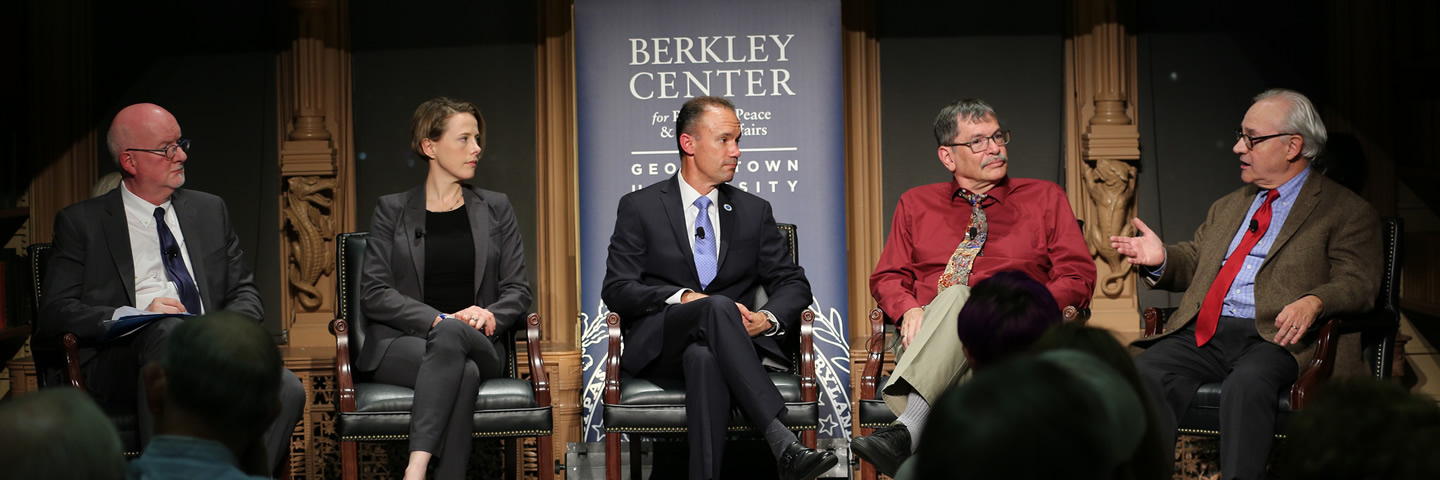
Religion is becoming a secondary concern for voters as American politics become more polarized, panelists concluded at a Berkley Center event analyzing religion in the 2018 midterm elections.
Berkley Center Director Dr. Shaun Casey moderated a panel featuring experts on religion and politics. Panelists discussed the discourse around Christian evangelical voters and their support for the Republican Party.
“In this case in particular, [media] coverage focused on the white evangelical voters,” said Rebecca Linder Blachly, director of government relations for the Episcopal Church. “There was a sense of continued bewilderment as to how it could be that white evangelical voters could extend their support to President Trump, and by extension, the Republican Party.”
Trump, Republicans as Strategic Choice
According to data from the Pew Research Center, approximately 75 percent of conservative Christians voted for the Republican Party. Berkley Center Research Fellow Eric Patterson interpreted evangelical support for Republicans and Trump as a reflection of strategic choices.
“There has been a claim that perhaps evangelicals shouldn’t support the president for a variety of reasons,” Patterson said.
Patterson cited several of Trump’s actions during his presidential campaign, such as appointing Vice President Mike Pence and releasing a list of conservative judges, as “signaling” to the evangelical community that he supported their political aims. In Patterson's view,
More important than anything, when we think of evangelical support for this president, we recognize it as a transactional relationship.
“One where there might not always be shared values, but they will have some sort of shared concerns where there’s policy that can be put into practice.”
Established Patterns at a Cost
E.J. Dionne, columnist for the Washington Post and a senior research fellow at the Berkley Center, disagreed with Patterson’s analysis of evangelical support for Trump. From his perspective,
I think that people are asking the wrong questions when they are mystified that white evangelicals were voting for Donald Trump.
“Trump simply got about the same white evangelical vote as other [Republican] candidates, pretty much since 2000.”
Professor Clyde Wilcox from the Georgetown University Department of Government also observed that the evangelical emphasis on conservative values has alienated younger evangelicals, noting that one-third of young evangelicals have left their faith.
“White evangelicals have achieved their greatest political influence under this administration,” Wilcox said. “The price for that has been to alienate young people, to alienate moderates, and to lose a lot of people in their faith tradition.”
Shifting Religious Demographics
Both Patterson and Wilcox highlighted the importance of religious participation in influencing voting behavior.
“About 75 percent of non-religious or non-Christians voted against Republican candidates,” Patterson said.
Wilcox highlighted the importance of a larger change in the American religious landscape. “The fastest-growing religious group in America is ‘unaffiliated,’” he said. “About 17 percent of Americans, and 40 percent of young people, are starting to identify that way.”
Religion Re-energized
Panelists discussed the role of religious organizations on all sides of the political spectrum. Wilcox focused his analysis on grassroots political organizing among minority communities. In his view,
One of the more interesting stories coming out of this election was the amazing efforts from black churches to get out the vote.
“There were some really amazing things in Georgia and in Florida. In one of the sermons I attended, they told people sitting in each pew to call everyone sitting on their pew on Tuesday and make sure that they voted.”
According to Linder Blachly,
[In the 2016 presidential election] there were very high hopes for the religious left.
“There’s been an ongoing discussion about whether or not there’s been a resurgence or reemergence or revitalization of progressive religious groups or groups who are more centrist, even compared to more conservative Christian evangelicals.”
